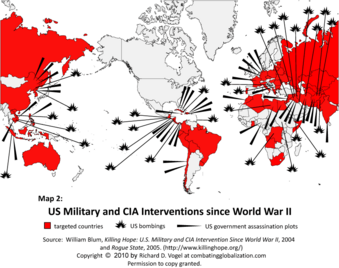American imperialism
While the United States of America undoubtedly has the greatest track record of imperialism, it also supported plenty of independence movements for the purpose of replacing colonial influence with a new global free-trade regime which served to benefit the US. This was the case in India, Africa, Vietnam (Ho Chi Minh himself was partnered with early on), and China, where the US pushed for the Open Door policy that would prevent European powers from carving up China and instead establish a policy of free trade.
The US also opposed the 1956 invasion of Egypt by Israel, the United Kingdom, and France in the Suez Crisis, triggered when the Egyptian leadership nationalized the Suez Canal. The canal's previous owners were Europeans who feared it could be closed to block oil shipments from the Persian Gulf to Europe, with Israel also particularly upset with Egypt for blocking the Straits of Tiran. The US sided with Egypt against its own allies and even threatened to refuse a massive loan the British needed for several reasons, for one being that it would destabilize the region and strengthen Soviet-backed liberation movements. [clarification needed] There were also protests in oil-rich and strategically important Islamic countries that were feared to come under Soviet influence, [clarification needed] with the US also wanting to prop up the anti-Soviet Middle Eastern Defense Organization. The Soviets also threatened to nuke the United Kingdom, France, and Israel if they did not withdraw. Although the three invading powers could have reasonably secured victory in Egypt, pressure from the United States ended up causing their withdrawal, a political defeat for the invaders. Many consider the Suez Crisis to be a final indicator that the British and French had lost their status as world powers and that the United States would be taking over as capitalist hegemon.
The US has around 80% of the world's foreign military bases, with roughly 750 of them in over 80 countries and costing the US over $80 billion a year. Al-Qaeda recruitment correlates with US troop presence in the Middle East, which conveniently gives more of an excuse to conduct aggressive intervention in the region. [clarification needed] [1]
Military influence and economic influence are closely intertwined in the phenomenon of imperialism. Elements of this article may be interconnected.
Military influence
Spending
The US spends more on its military than the next 9 countries — China, India, the UK, Russia, France, Germany, Saudi Arabia, Japan, and South Korea — combined. In 2021, its expenditure was $801 billion.[2] Its carbon emissions are greater than 140 whole countries, putting it on par with the entire emissions of Portugal or Finland.[3]
South America
Eastern Europe
Pacific Ocean
The United States has a long history of asserting its power in the Pacific starting with the mission of Matthew C. Perry to Japan, economic takeover and eventual annexation of Hawaii, and intervention in the Boxer Rebellion. During World War II, the Japanese attempt to wrest control was unsuccessful, and American influence is now unquestioned throughout the Pacific region.
Economic influence
Funds payments
By leveraging its general influence and the dependence of international payments systems on its clearing houses, the United States projects inordinately large authority over transfers of funds around the world. Part of this is done through the Society for Worldwide Interbank Financial Telecommunication (SWIFT), which provides services for transferring payments between banks worldwide. Despite being based in Belgium, its data is intercepted and retained by the NSA[4] and the US government uses it to cut off several countries at odds with US foreign policy, including Iran, North Korea, and Russia, from banking services on the system. Around half of international trade is dollar-denominated, with the bulk of that cleared through US banks — as it is then under US jurisdiction, the government can then monitor, deny, or even seize transfers.[5] In 2012 for example, a Danish businessman bought $20,000 of Cuban cigars from a Hamburg-based distributor, but the transaction, which was routed through the US, was frozen by authorities there on the basis that it violated the American trade embargo against Cuba — though the businessman appealed, he was informed it will not be returned to him.[6]
Global financial institutions
See also
Notes
References
- ↑ FACT SHEET. Overseas Base Realignment and Closure Coalition.
- ↑ The United States Spends More on Defense than the Next 9 Countries Combined. Peter G. Peterson Foundation.
- ↑ One word makes this claim about US military pollution false | Verify. WUSA9.
- ↑ NSA Spies on International Payments. Der Spiegel.
- ↑ America’s aggressive use of sanctions endangers the dollar’s reign. The Economist.
- ↑ US snubs out legal cigar transaction. The Copenhagen Post.
